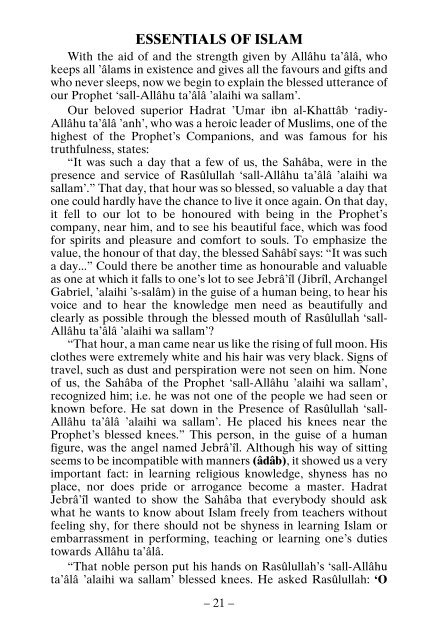Belief and Islam
BELIEF AND ISLAM star This work, Belief and Islam, originally was written in Persian under the title I’tiqâd-nâma by Hadrât Mawlânâ Khâlid al-Baghdâdî, a profound ‘âlim of Islam and a specialist in ma’ârif of tasawwuf. Hâji Faydullah Effendi of Kemah, a khalîfa of great walî Mavlânâ Mahmûd Sâhib, the brother of the author, translated the book into Turkish and named it Farâid-ul-fawâid which was printed in Istanbul in 1312 A.H.[1894]. Our bookstore had it translated again from the Persian original into Turkish and, some explanations and three chapters, published it with the title Imân ve Islâm in 1966. German, French and Arabic versions are also published by our bookstore. This book, explains five fundamentals of Islam, six fundamentals of îmân and the contemporary information about the matter and refutes those who are against Islam and those who are lâ-madbhabî.
BELIEF AND ISLAM
star This work, Belief and Islam, originally was written in Persian under the title I’tiqâd-nâma by Hadrât Mawlânâ Khâlid al-Baghdâdî, a profound ‘âlim of Islam and a specialist in ma’ârif of tasawwuf. Hâji Faydullah Effendi of Kemah, a khalîfa of great walî Mavlânâ Mahmûd Sâhib, the brother of the author, translated the book into Turkish and named it Farâid-ul-fawâid which was printed in Istanbul in 1312 A.H.[1894]. Our bookstore had it translated again from the Persian original into Turkish and, some explanations and three chapters, published it with the title Imân ve Islâm in 1966. German, French and Arabic versions are also published by our bookstore. This book, explains five fundamentals of Islam, six fundamentals of îmân and the contemporary information about the matter and refutes those who are against Islam and those who are lâ-madbhabî.
Create successful ePaper yourself
Turn your PDF publications into a flip-book with our unique Google optimized e-Paper software.
ESSENTIALS OF ISLAM<br />
With the aid of <strong>and</strong> the strength given by Allâhu ta’âlâ, who<br />
keeps all ’âlams in existence <strong>and</strong> gives all the favours <strong>and</strong> gifts <strong>and</strong><br />
who never sleeps, now we begin to explain the blessed utterance of<br />
our Prophet ‘sall-Allâhu ta’âlâ ’alaihi wa sallam’.<br />
Our beloved superior Hadrat ’Umar ibn al-Khattâb ‘radiy-<br />
Allâhu ta’âlâ ’anh’, who was a heroic leader of Muslims, one of the<br />
highest of the Prophet’s Companions, <strong>and</strong> was famous for his<br />
truthfulness, states:<br />
“It was such a day that a few of us, the Sahâba, were in the<br />
presence <strong>and</strong> service of Rasûlullah ‘sall-Allâhu ta’âlâ ’alaihi wa<br />
sallam’.” That day, that hour was so blessed, so valuable a day that<br />
one could hardly have the chance to live it once again. On that day,<br />
it fell to our lot to be honoured with being in the Prophet’s<br />
company, near him, <strong>and</strong> to see his beautiful face, which was food<br />
for spirits <strong>and</strong> pleasure <strong>and</strong> comfort to souls. To emphasize the<br />
value, the honour of that day, the blessed Sahâbî says: “It was such<br />
a day...” Could there be another time as honourable <strong>and</strong> valuable<br />
as one at which it falls to one’s lot to see Jebrâ’îl (Jibrîl, Archangel<br />
Gabriel, ’alaihi ’s-salâm) in the guise of a human being, to hear his<br />
voice <strong>and</strong> to hear the knowledge men need as beautifully <strong>and</strong><br />
clearly as possible through the blessed mouth of Rasûlullah ‘sall-<br />
Allâhu ta’âlâ ’alaihi wa sallam’?<br />
“That hour, a man came near us like the rising of full moon. His<br />
clothes were extremely white <strong>and</strong> his hair was very black. Signs of<br />
travel, such as dust <strong>and</strong> perspiration were not seen on him. None<br />
of us, the Sahâba of the Prophet ‘sall-Allâhu ’alaihi wa sallam’,<br />
recognized him; i.e. he was not one of the people we had seen or<br />
known before. He sat down in the Presence of Rasûlullah ‘sall-<br />
Allâhu ta’âlâ ’alaihi wa sallam’. He placed his knees near the<br />
Prophet’s blessed knees.” This person, in the guise of a human<br />
figure, was the angel named Jebrâ’îl. Although his way of sitting<br />
seems to be incompatible with manners (âdâb), it showed us a very<br />
important fact: in learning religious knowledge, shyness has no<br />
place, nor does pride or arrogance become a master. Hadrat<br />
Jebrâ’îl wanted to show the Sahâba that everybody should ask<br />
what he wants to know about <strong>Islam</strong> freely from teachers without<br />
feeling shy, for there should not be shyness in learning <strong>Islam</strong> or<br />
embarrassment in performing, teaching or learning one’s duties<br />
towards Allâhu ta’âlâ.<br />
“That noble person put his h<strong>and</strong>s on Rasûlullah’s ‘sall-Allâhu<br />
ta’âlâ ’alaihi wa sallam’ blessed knees. He asked Rasûlullah: ‘O<br />
– 21 –

















